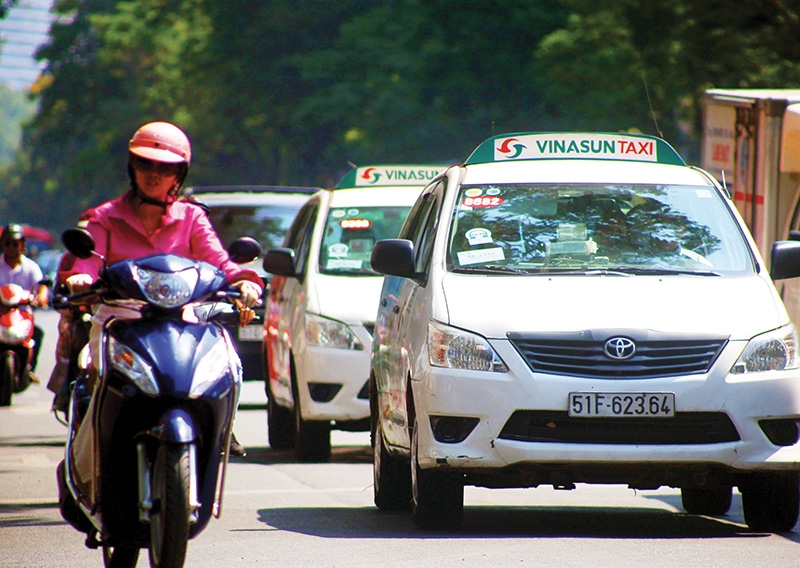Law case illustrating need for new thinking
 |
| The court declared that the first-instance compensation ordered from Grab was reasonable Photo: Le Toan |
Nguyen Thai Hai Van, CEO of Grab Vietnam said, “Today is a sad day for technology and innovation in Vietnam. We are saddened that the panel has agreed to the first judgment, despite the strong arguments by Grab. The People’s Procuracy and the Supreme People’s Procuracy in Ho Chi Minh City have confirmed that there is no evidence proving that the damage claimed by Vinasun was caused by Grab’s business activities.”
As previously reported by VIR, Vinasun filed a lawsuit against Grab in 2017, claiming that the latter’s illegal activities were causing more than half of the VND76 billion ($3.25 million) losses it had suffered in 2016 and the first half of 2017.
At last week’s hearing, the court dismissed the previous appeals of both companies and upheld the first-instance judgment from December. The court stated that Vinasun’s loss of earnings were partially due to Grab’s operations in Vietnam. Thus, Grab has to pay VND4.8 billion ($208,000) in damages incurred from idle vehicles to Vinasun.
According to the court, the slump in Vinasun’s earnings was attributable to several factors such as management, service quality, and changing customer demand. Therefore, the appellate adjudication panel did not accept Vinasun’s claim in full.
Commenting on the ruling, Truong Dinh Quy, deputy director-general of Vinasun said, “The court did not accept our appeal, in which we seek VND42 billion ($1.8 million) in compensation. However, we are very happy with the results of the appellate adjudication as it reflects Grab’s illegal activities and the damage it has caused.”
Meanwhile, Nguyen Thai Hai Van commented, “Notwithstanding the decision, we will continue to strongly protect our brand and reputation against the baseless allegations that were made by Vinasun against us at court. With this in mind, we will seek recourse to ensure our right to a fair trial and that due process is served.”
According to industry insiders, the unprecedented case between the two firms reflects the mindset of Vietnam’s judicial system towards new business trends and innovation, and a legal fight between the new and the old, and between short-sighted protectionism and competition.
However, the battle between traditional taxi companies and platforms such as Grab is not unique to Vietnam. Many other countries, including the US where the model was developed first through Uber, had to resolve this legislation ambiguity.
The major question in these battles is how to ensure that traditional taxi companies can still maintain a decent level of activity while allowing other companies to innovate in order to offer better value for money to consumers.
In an effort to regulate ride-hailing firms, Vietnam has officially legalised ride-hailing businesses, after a four-year pilot programme. Decree No.10/2020/ND-CP, which will come into force on April 1, stipulates that technology-based ride-sharing companies have to attach a contract car sign on their partners’ vehicles.
Meanwhile, taxi operators are granted the option of either installing lightboxes or using taxi decals on the windshield.
The Vinasun-Grab case highlights the challenge behind disruptive businesses that are using technology and follow a completely new economic model which does not typically fit into the legislative framework, according to Julien Brun, managing partner of CEL Consulting.
Whether the framework should evolve or companies should try to fit in what has been defined in the past remains open. Politically, it is about the balance between the favouring innovation and ensuring compliance.
Brun added that new competition also requires taxi companies to innovate in order to remain attractive. However, fair competition also requires clear rules, and the issue here is whether these companies are comparable and whether they should follow the same rules.
“Whether these fair competition rules are clear enough is the main question. If they are not clear enough, then penalising a company for not following unclear rules will set a precedent that could impede the trust and confidence of companies and their chance of being successful in the Vietnamese market,” he noted.
“The outcome of this trial is interesting to observe and, whether Grab deserves to be penalised or not, the message it will convey is the most important part. Regardless of the business model, the rules need to be respected, provided that they are clear,” Brun added.
What the stars mean:
★ Poor ★ ★ Promising ★★★ Good ★★★★ Very good ★★★★★ Exceptional
Themes: Digital Transformation
- PM sets five key tasks to accelerate sci-tech development
- Ho Chi Minh City launches plan for innovation and digital transformation
- Dassault Systèmes and Nvidia to build platform powering virtual twins
- Sci-tech sector sees January revenue growth of 23 per cent
- Advanced semiconductor testing and packaging plant to become operational in 2027
Related Contents
Latest News
More News
- PM outlines new tasks for healthcare sector (February 25, 2026 | 16:00)
- Ho Chi Minh City launches plan for innovation and digital transformation (February 25, 2026 | 09:00)
- Vietnam sets ambitious dairy growth targets (February 24, 2026 | 18:00)
- Masan Consumer names new deputy CEO to drive foods and beverages growth (February 23, 2026 | 20:52)
- Myriad risks ahead, but ones Vietnam can confront (February 20, 2026 | 15:02)
- Vietnam making the leap into AI and semiconductors (February 20, 2026 | 09:37)
- Funding must be activated for semiconductor success (February 20, 2026 | 09:20)
- Resilience as new benchmark for smarter infrastructure (February 19, 2026 | 20:35)
- A golden time to shine within ASEAN (February 19, 2026 | 20:22)
- Vietnam’s pivotal year for advancing sustainability (February 19, 2026 | 08:44)

 Tag:
Tag:




















 Mobile Version
Mobile Version